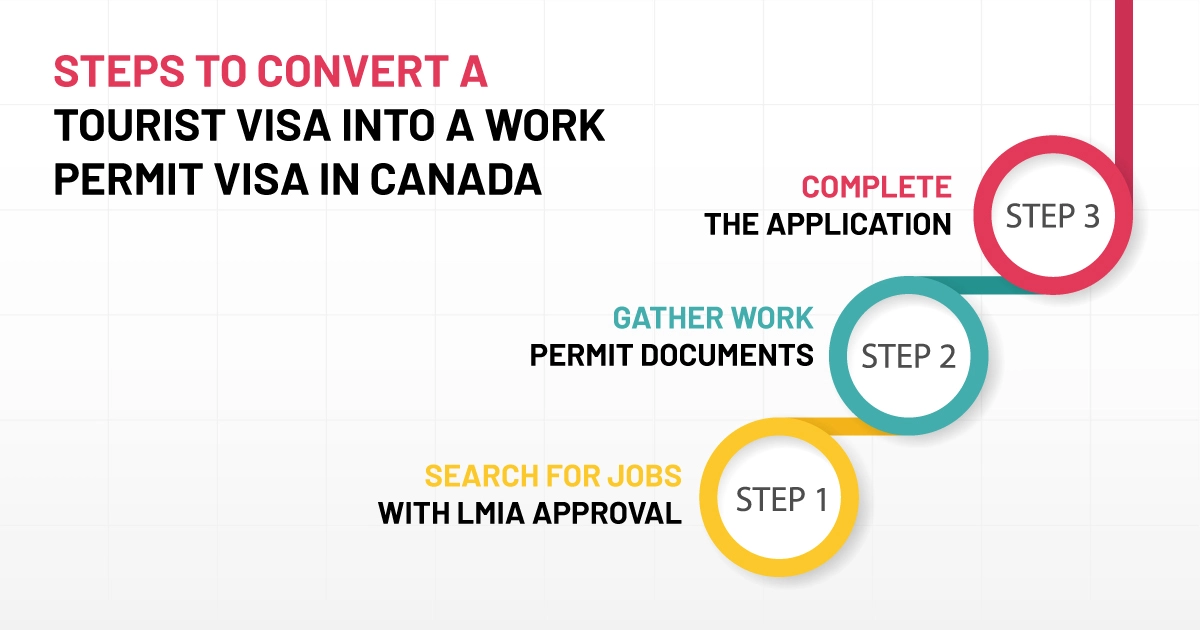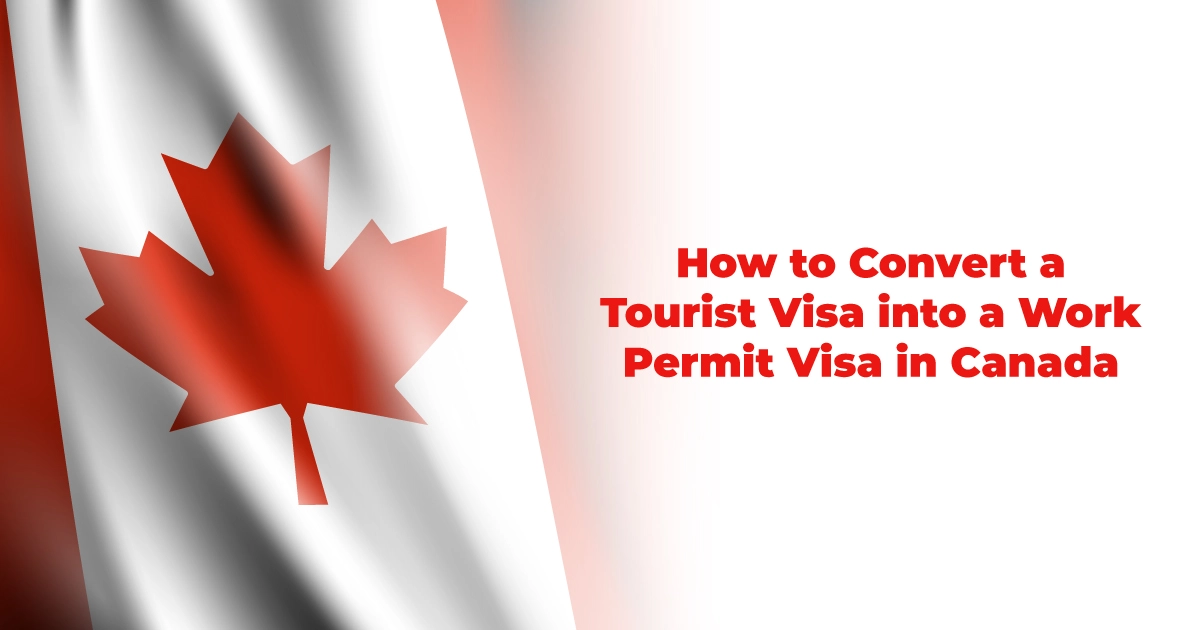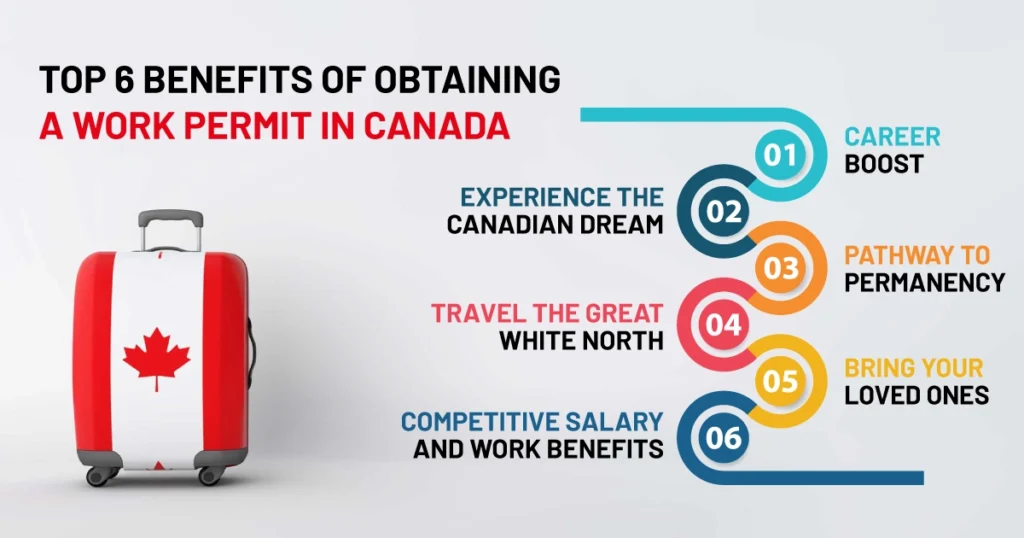Dreaming of turning your Canadian vacation into a work opportunity? While not a straightforward process, there might be a way to convert your tourist visa into a work permit visa in Canada. This temporary program allows visitors with valid job offers to apply for work permission, but there are important steps to follow. Let’s explore how you can potentially make Canada your work playground.
What is a Tourist Visa?
A Canadian Tourist Visa allows you to visit Canada for leisure, tourism, or to see family and friends. However, you cannot work or get paid while on a tourist visa in Canada.
What is a Work Visa?
A work visa in Canada lets you legally work for a specific employer and occupation. You’ll need a valid job offer with LMIA (Labour Market Impact Assessment) approval to apply.
What are the Differences Between a Tourist Visa and a Work Visa?
A tourist visa allows you to come to Canada temporarily for entertainment, tourism, or short-term stays. This does not entitle you to work or earn money while you are in the country.
On the other hand, a work visa is for people who receive a job offer from a Canadian employer and want to work legally in Canada. This visa allows you to live and work in Canada temporarily or permanently, depending on the type of work permit issued.
Work visas require specific documents, such as a job offer, and may have additional requirements depending on the type of job and length of stay.
Documents Needed to Convert a Tourist Visa into a Work Permit Visa in Canada
Completed application forms: This includes the main application form (IMM 1295) and any additional forms required based on your situation.
Proof of your status in Canada: If you’re already in Canada, you’ll need documents like your passport and a valid tourist visa (if applicable).
Family member information (if applicable): If you’re bringing family members with you, you’ll need proof of their relationship (marriage certificate, birth certificates) and their status documents.
Valid travel document or passport: This should be valid for your entire intended stay in Canada.
Two recent passport-sized photos: Make sure they meet the specific requirements outlined by Canadian immigration.
Evidence you meet the job requirements: This could include your resume, diplomas, certificates, or work experience letters.
A written offer of employment from a Canadian employer: This offer should be valid and include details about the job, your salary, and your work schedule.
Labor Market Impact Assessment (LMIA) in some cases: This document, obtained by your employer, shows the employer tried to hire a Canadian citizen or permanent resident first. It’s not required for all jobs.
Proof of financial means (may be requested): This could be bank statements or proof of employment to show you can support yourself while in Canada.
Medical exam results (if requested): In some cases, you may need to get a medical exam completed by a doctor approved by Canadian immigration.
Payment for applicable government fees: Make sure you pay the correct fees associated with your application.
Steps to Convert a Tourist Visa into a Work Permit Visa in Canada
Converting a tourist visa to a work permit in Canada is tricky but possible under a temporary program until February 2025. Here’s a simplified approach:
- Search for Jobs with LMIA Approval: Focus your job search on opportunities where the employer already has a positive Labour Market Impact Assessment (LMIA).
- Gather Work Permit Documents: Research and collect all the documents required for a Canadian work permit application.
- Complete the Application: Once you have a job offer with LMIA and all necessary documents, submit your work permit application.
Canada Work Permit Processing Time
The processing time for a work permit in Canada can vary depending on several factors, but here’s a general idea:
Estimated Range: It can take anywhere from 5 to 36 weeks to process a work permit application, according to canada.ca.
Online vs. Paper: Processing can be faster if you apply online compared to submitting paper applications.
Your Situation: Factors like your nationality, the complexity of your application, and current workloads at Immigration, Refugees, and Citizenship Canada (IRCC) can also impact processing times.
Top 6 Benefits of Obtaining a Work Permit in Canada
Here are the top 6 benefits of obtaining a work permit in Canada:
Career Boost: Gain experience with top Canadian companies, enhance your resume, and potentially explore new industries you’re passionate about.
Experience the Canadian Dream: Enjoy the high quality of life Canada offers, with excellent healthcare, education, and a welcoming multicultural environment.
Pathway to Permanency: Having a work permit can give you a head start if you dream of immigrating to Canada permanently. Some work permits even offer easier transitions under specific programs.
Travel the Great White North: Depending on the work permit type, you might be able to travel freely within Canada. Some programs even allow for short-term work authorization in the US or Mexico!
Bring Your Loved Ones: In some cases, specific work permits allow you to bring your spouse and dependent children to Canada, letting you build a life together.
Competitive Salary and Work Benefits: Canada boasts a strong job market with competitive salaries and employee benefits like health care and paid leave.
How a RCIC can Help to Convert a Tourist Visa into a Work Permit Visa in Canada
While a Canadian RCIC (Regulated Canadian Immigration Consultant) can’t guarantee converting a tourist visa to a work permit in Canada, their expertise can be very helpful in this complex process, especially with the current temporary program expiring in February 2025. Here’s why:
Understanding Eligibility: An RCIC can assess your situation and determine if you’re eligible for the temporary program that allows conversion from a tourist visa to a work permit. They can also advise on alternative work permit options if you don’t qualify for this specific program.
Job Offer Guidance: Finding a job offer with LMIA (Labour Market Impact Assessment) approval is crucial for this conversion. An RCIC can help you with strategies for finding employers who are open to hiring foreign workers and navigating the LMIA process.
Application Expertise: The work permit application process can be complicated. An RCIC can ensure your application package is complete, accurate, and meets all the requirements for a higher chance of success.
Communication and Advocacy: RCICs can communicate with Canadian immigration authorities on your behalf, clarifying any questions or potential issues that might arise during the application process.
Staying up-to-date: Immigration regulations can change frequently. An RCIC keeps up-to-date with the latest information and procedures involved in converting a tourist visa to a work permit.
Kaesur Rahman- Top RCIC in Canada
RCIC Kaesur Rahman, founder of La Vie Immigration Services Inc., can guide you through the complex process, from profile assessment to application. Avoid the hassle and maximize your chances of success—schedule a consultation with Kaesur Rahman today! La Vie can even help you explore permanent residency options down the road, making Canada your forever home.







